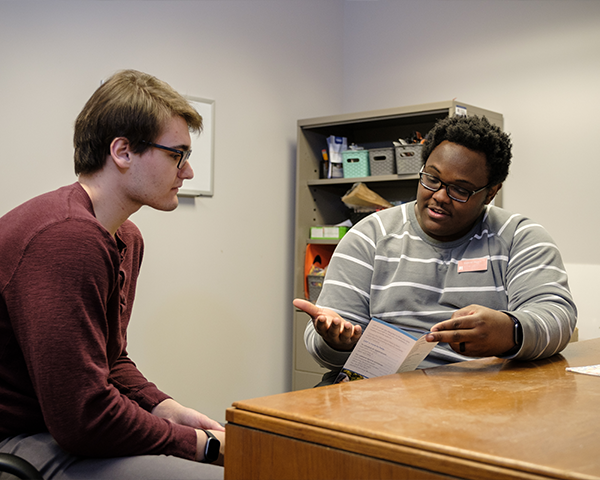 Master the high-tech field of automotive technology. Our hands-on program is certified
by the National Automotive Technicians Education Foundation (NATEF) for Automotive
Service Excellence (ASE). This is a high-demand, well-paid industry. Ask our graduates—99%
are working in this field. Iowa's Last-Dollar Scholarship may cover your tuition.
Master the high-tech field of automotive technology. Our hands-on program is certified
by the National Automotive Technicians Education Foundation (NATEF) for Automotive
Service Excellence (ASE). This is a high-demand, well-paid industry. Ask our graduates—99%
are working in this field. Iowa's Last-Dollar Scholarship may cover your tuition.
What You Learn in Automotive Technology
Use sophisticated diagnostic equipment to service a range of vehicles. Study brake systems, steering, electrical circuits, and transmissions. Get plenty of hands-on practice under the hood. Leave here with a toolbox of skills and up to eight industry-standard certifications.
What Can I do With an Automotive Technology Degree?
Choose from many roads in the Automotive Technology industry. Work as a hands-on technician, advisor, or service manager. Sell parts or cars and trucks. Keep a city's wide-ranging fleet of emergency, park, road, and sanitation vehicles running smooth. Your EICC education prepares you to work in small shops and large dealerships, in parts distribution and service advising.
A Solid Foundation
Automotive Safety
Inside the shop
Automotive Safety
Learn to stay safe under the hood and chassis.
Auto Electricity
Run with it!
Auto Electricity
Powered by today's electronics and steadfast mechanical principals.
Brake Systems & Service
Stop!
Brake Systems & Service
Learn disc and drum brakes, power and conventional systems, and more.
Suspension & Steering
Make it smooth
Suspension & Steering
Keep suspension and steering systems in top condition.
Similar Programs
Not quite right? Consider these instead:

Tour the Automotive Lab

Program Standards
All students in the Automotive Technology program are expected to meet certain technical standards that are essential to the successful completion of all phases of the program, and that reflect industry requirements and standards.
LEARN MORE ABOUT Program Standards
Iowa's Last-Dollar Scholarship
You may be eligible to earn a degree in this high-demand field for zero tuition costs! File for financial aid and if you qualify, the state covers the remaining balance beyond the aid for which you are eligible. More than two dozen career programs qualify, including this one. File your FAFSA by July 15.
Learn More
ASE Certified
Our Automotive Technology program is certified by Automotive Service Excellence (ASE). And we want the same for our graduates. We prepare them for certification tests in eight areas: Engine Repair, Manual Drive Train & Axles, Brakes, Heating & Air Conditioning, Automatic Transmission/Transaxle, Suspension & Steering, Electrical/Electronics Systems, and Engine Performance.

Invest in your future career
You need the 'tools of the trade' to get started in this program, and throughout your career, too. This equipment will cost an estimated $1,000 - $4,000, but don't worry, you may qualify for programs to help cover the expense. We also invite vendors, like Snap-On, to campus. Some offer up to a 50% discount if you buy off the truck. Questions? Please ask. We're here to help.

Career Services
EICC’s Career Services department helps you refine goals, search for jobs, and launch a profession. Looking for work or an internship? Regional and national employers post openings on our job posting site. Upload your resume. Refresh it first using our free online tool. Meet with an EICC career coordinator to do a mock interview or to learn more about career pathways.
REACH YOUR CAREER GOALS
Start in High School
Get a jump on your college education while you're in high school. Choose a Career Academy and complete a semester to a full year of courses. It's free for most students and cuts down on the time you spend completing your EICC degree, often in half. Save time and money, and launch your career sooner.
LEARN MORE ABOUT CAREER ACADEMIESYour Degree = Success
Complete your education in two years. Qualify for better jobs. Earn a higher salary. Enjoy a better quality of life. The benefits of an associate's degree are impressive and wide-ranging.
Explore the value of an associate’s degreeEmployment and Wage Outlook
How to Pay for EICC
College is more affordable than you think, especially when you factor in federal and state aid, loan options, scholarships, institutional grants, and Work-Study.
Contact Admissions
Contact the admissions representative from the college you plan to attend. If you’re not sure, you may contact any rep. Each can answer questions about any college or program.
Office Hours: Monday - Friday, 8 a.m. - 4:30 p.m.
Request InfoAutomotive Technology: Locations
Clinton Community College
1000 Lincoln Blvd.
Clinton, IA 52732
Map and Directions
Muscatine Community College
152 Colorado St.
Muscatine, IA 52761
Map and Directions
Scott Community College
500 Belmont Rd.
Bettendorf, IA 52722
Map and Directions




